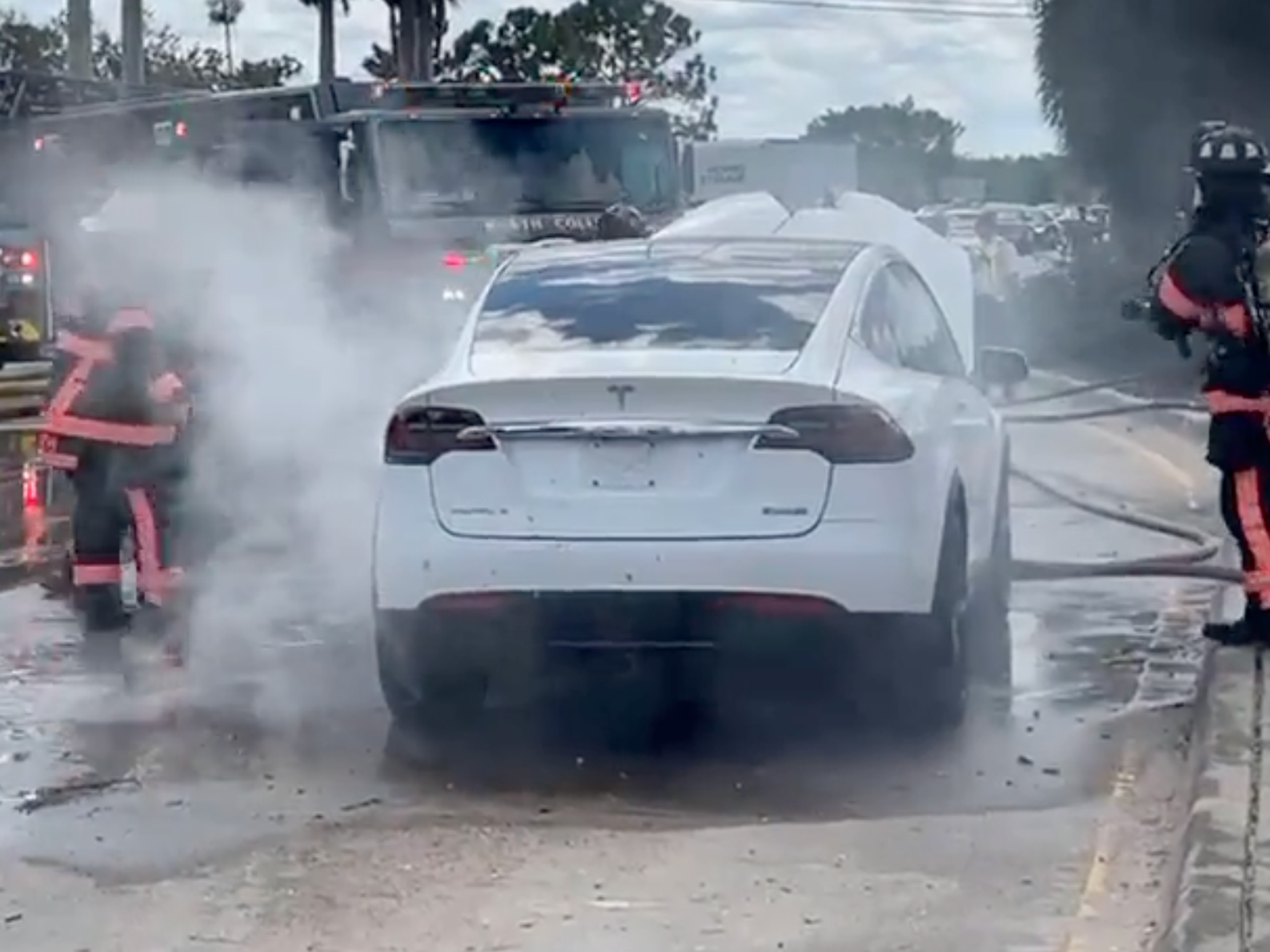Why EVs Are Catching Fire After Hurricane Ian
Samson Amore is a reporter for dot.LA. He holds a degree in journalism from Emerson College. Send tips or pitches to samsonamore@dot.la and find him on Twitter @Samsonamore.

Hurricane Ian made a devastating landfall in Florida in late September and as the category four storm ripped through the state an unexpected problem surfaced – a rise in electric vehicle battery fires.
In one case, a Tesla submerged by hurricane floodwaters saw its lithium-ion battery corrode and go up in flames, causing firefighters to dump a staggering 1,500 gallons of water on it to put out the blaze.
Our own intrepid electric vehicle reporter David Shultz recently broke down the issue with these batteries. Here are a few highlights to put this crisis in perspective.
Lithium-Ion Batteries Are the Standard
Almost every EV uses lithium-ion batteries, including Teslas. But there are alternatives. “Solid state batteries, for example, are often touted as being more stable and less likely to ignite, though some research suggests the question may be a bit more complex than that,” writes Shultz. “Other companies, like Battery Streak, in Camarillo, CA, are adding exotic materials to more traditional lithium-ion battery formulations in an effort to improve the thermal characteristics and performance.”
As such, Schultz adds, “If any of these companies can find a way to reliably mass produce these batteries and get them into EVs, the cars of tomorrow may prove considerably safer than anything on the road today, at least in terms of fire risk.”
These Types of Fires Are Difficult To Control
It’s not uncommon for Lithium-Ion batteries to explode, but typically that only happens under extreme heat conditions. The fires that do ignite are often difficult to mitigate since the battery can repeatedly burst into flames, making the issue even more difficult for emergency responders.
“The thing that makes lithium-ion battery fires so serious is that they create a feedback loop known as thermal runaway: Once the battery overheats the electrolytes in the cell catch on fire, which creates more heat, which ignites more electrolytes, etc., etc.” writes Shultz.
In addition, Shultz writes, “Traditional means of stopping the fire, like dousing it in water, are often insufficient to put out the flames because the battery packs are hard to reach and retain enough heat to reignite over and over again as soon as the water stops flowing. In 2019, Firefighters in the Netherlands were forced to submerge a BMW i8 in a tank of water for 24 hours due to a particularly persistent battery fire.”
… But Gas Is Also Dangerous
While it's easy to seize on any bad news about EVs to serve larger political goals of sandbagging the industry in favor of backing up Big Oil, it’s not just EVs at risk of spontaneous ignition.
“While lithium-ion battery fires are nasty and dangerous, calculating the risk they pose to drivers presents a somewhat different picture,” writes Shultz. “A 2017 report [PDF] from the National Highway Traffic Safety Administration, concluded that…’the propensity and severity of fires and explosions from the accidental ignition of flammable electrolytic solvents used in Lithium-ion battery systems are anticipated to be somewhat comparable to or perhaps slightly less than those for gasoline or diesel vehicular fuels. The overall consequences for Lithium-ion batteries are expected to be less because of the much smaller amounts of flammable solvent released and burning in a catastrophic failure situation.’”
TL;DR gasoline is also flammable. Not to mention, internal combustion engines also have batteries.
- Lithium-Ion Batteries Might Have a Fire Problem - dot.LA ›
- What to Do When Winter Travel Chills Your EV Battery - dot.LA ›
- TikTok Is Flooded With Storm Content - dot.LA ›
- LAIT911 Sees Huge Spike In Traffic During SoCal Floods - dot.LA ›
- Battery Company Storedot Opens In Irvine - dot.LA ›
- The US Needs A lot More Lithium Before The Switch to EVs - dot.LA ›
- How Battery Streak Plans to Charge Batteries Within Minutes - dot.LA ›
Samson Amore is a reporter for dot.LA. He holds a degree in journalism from Emerson College. Send tips or pitches to samsonamore@dot.la and find him on Twitter @Samsonamore.





 Image Source: Skyryse
Image Source: Skyryse